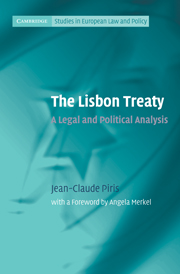Book contents
- Frontmatter
- Contents
- List of boxes
- Foreword by Angela Merkel, Chancellor of the Federal Republic of Germany
- Acknowledgements
- Table of cases
- List of abbreviations
- Introduction
- I The origins and birth of the Lisbon Treaty
- II General provisions
- III Democracy
- IV Fundamental Rights
- V Freedom, Security and Justice
- VI Institutions
- VII External affairs
- VIII Financial, economic, social and other internal affairs
- Conclusion: the Lisbon Treaty and beyond
- Appendixes
- 1 The judgment of 30 June 2009 of the Federal Constitutional Court of Germany on the Lisbon Treaty
- 2 The judgment of 26 November 2008 of the Czech Constitutional Court on the Lisbon Treaty
- 3 List of provisions on a simplified revision procedure and of passerelles
- 4 Existing legal bases switched to the ordinary legislative procedure (codecision)
- 5 New legal bases
- 6 List of Articles in the TEU and in the TFEU which enable the European Council to take decisions having legal effects
- 7 Existing legal bases switched from unanimity to qualified majority voting
- 8 Pre-existing legal bases where unanimity, common accord or consensus continues to apply
- References
- Index
- References
1 - The judgment of 30 June 2009 of the Federal Constitutional Court of Germany on the Lisbon Treaty
Published online by Cambridge University Press: 05 June 2012
- Frontmatter
- Contents
- List of boxes
- Foreword by Angela Merkel, Chancellor of the Federal Republic of Germany
- Acknowledgements
- Table of cases
- List of abbreviations
- Introduction
- I The origins and birth of the Lisbon Treaty
- II General provisions
- III Democracy
- IV Fundamental Rights
- V Freedom, Security and Justice
- VI Institutions
- VII External affairs
- VIII Financial, economic, social and other internal affairs
- Conclusion: the Lisbon Treaty and beyond
- Appendixes
- 1 The judgment of 30 June 2009 of the Federal Constitutional Court of Germany on the Lisbon Treaty
- 2 The judgment of 26 November 2008 of the Czech Constitutional Court on the Lisbon Treaty
- 3 List of provisions on a simplified revision procedure and of passerelles
- 4 Existing legal bases switched to the ordinary legislative procedure (codecision)
- 5 New legal bases
- 6 List of Articles in the TEU and in the TFEU which enable the European Council to take decisions having legal effects
- 7 Existing legal bases switched from unanimity to qualified majority voting
- 8 Pre-existing legal bases where unanimity, common accord or consensus continues to apply
- References
- Index
- References
Summary
In its judgment of 30 June 2009 (63 pages, 421 paragraphs), the Federal Constitutional Court of Germany found that the Act approving the Lisbon Treaty as well as the Act amending the German Basic Law (i.e. the German Constitution, Grundgesetz – hereinafter GG), are compatible with the GG. However, the Court found that the ‘Act Extending and Strengthening the Rights of the Bundestag and the Bundesrat in EU Matters’ infringes the GG, insofar as those bodies have not been accorded sufficient rights of participation in EU law-making and treaty amendment procedures. Following this judgment, an Act extending the parliament's rights was adopted on 8 (Bundestag) and 18 (Bundesrat) September 2009, which enabled Germany's instrument of ratification of the Lisbon Treaty to be finally signed and deposited on 25 September 2009.
While the Court's judgment opened the way for ratification of the Lisbon Treaty by Germany, the possibility that this judgment might affect the future development of the European integration process cannot be excluded. In any case, the operation of the Treaties' provisions which aim to facilitate and accelerate the work of the EU, such as the ‘flexibility clause’ (Article 352 TFEU), the passerelles and simplified revision procedures, will certainly be slowed down.
A brief summary of the Court's judgment
The main standard of review against which the Court measured the constitutionality of the Act approving the Lisbon Treaty is the relation between the requirements of the GG and the stage of development reached by European integration.
- Type
- Chapter
- Information
- The Lisbon TreatyA Legal and Political Analysis, pp. 341 - 358Publisher: Cambridge University PressPrint publication year: 2010



